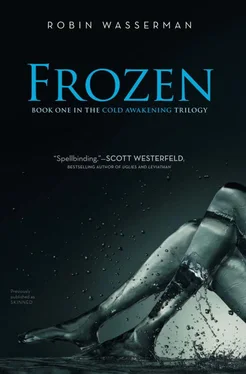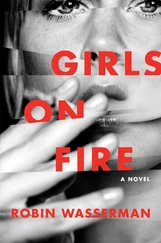I didn’t smile.
In class, even the teachers stared, not like they had much else to do beyond babysit us while we got our real education from the network. Which meant I watched my ViM screen while the rest of them watched me. The only relief came in biotech, usually the worst of all possible evils, but hidden behind the thick plastic face mask, hunched over my splicing kit, I could almost pass for normal.
Walker didn’t respond to my text about lunch, and when I showed up in the cafeteria, he wasn’t there. So I sat with the usual suspects—plus Zo—at the usual table in the front of the room, where everyone could look as much as they wanted. Surrounded by my friends, it was almost possible to pretend they were staring for the old reasons, wondering what we had that they didn’t, where they’d gone wrong between then —the half-remembered, better-forgotten days of all-men-are-created-equal playdates and birthday parties when no one cared how loud you were, how rude you were, how ugly you were, how stupid you were, how lame you were, because we were all too young and so too dumb to notice—and now , when how you looked and how you talked mattered as much as it should.
The Helmsley School was built three hundred years ago, for people who were almost as rich as we were, and the cafeteria, with its wood panels, floor-to-ceiling windows, and scalloped ceiling, was a suitably regal match for the exterior, all stone columns and brick arches. Thanks to the population crash and the upswing in linked ed, only half the tables were filled, but any group larger than three is enough for an us/them divide. After all, that was—as we’d learned in kindergarten—the key to civilization and the survival of the species. Finite supply plus infinite demand equaled conflict, battle, nature red in tooth and claw; bloody struggle for turf, status, sex equaled survival of the fittest. And we were the fittest.
Staying at the top meant defying expectations and reversing the norm, because there was nothing exclusive about acting like everyone else. Which meant that if the rest of the school was gaping at my new face and freakish body, my friends, not to mention the people I counted as friends by virtue of social proximity, would ignore the obvious, forgo the questions, and act as if they ate with a skinner every day—as, from now on, they would. Except for the fact that the skinner wasn’t eating.
Which wasn’t as awkward as the fact that my sister was. And was doing so at my table.
Or the fact that everyone else was tricked out in retro slum gear, just like her. I was the only person wearing anything with visible tech—the only person at the table, at least. I was dressed exactly like everyone else in the room. Normal.
But the clothes didn’t explain why everything felt so wrong. You didn’t claw your way to the top of the pyramid without knowing how to read people. You needed a radar, something to sense the smallest of fluctuations in the social field. You needed the skills to know, even with your eyes closed and your ears plugged, who was scheming, who was suffering, who was gaining on you, who was on the way out. If you couldn’t figure out that last one, chances are, it was you.
It wasn’t the kind of thing you could learn. You either had it or you didn’t.
Except it turned out there was a third option: You had it, and then you lost it.
Part of it was them. No one could act normal, not while I was in the room.
Part of it was me.
The things I used to know about people, the things I understood … It wasn’t a rational thing. It was just something I felt , like the way I could feel when someone was watching me.
I couldn’t do that anymore either.
I felt like I’d gone blind.
It didn’t help that I barely knew half the people at the table, especially the two grunters pawing Cass and Terra—the reason, I quickly found out, they’d run off so quickly that morning. New season, new boys.
No sign of Walker.
No one asked me where he was.
Bliss had picked that day’s b-mod, which meant—big surprise—everyone was blissed out. Everyone except me, since b-mods wouldn’t do much for someone without brain chemicals to modify. I’d half expected them to opt for some retro drugs to match the retro clothes. Some of Zo’s dozers, maybe, or even something alcohol based, like in the bad old days of hangovers and beer bellies. But no matter how in retro was, it couldn’t offer anything that would kick in immediately and wear off by the end of the period. Advantage: b-mods. As far as I was concerned, bliss mods were bad enough when I was on them too, always leaving a weird moody aftertaste, like crashing after a sugar high. Staying cold sober while the rest of them blissed up? Infinitely worse.
“So do you have, like, superpowers?” That was Cass’s mouth breather. It was worse when guys giggled. That just wasn’t natural. “Are you an evil crime fighter now?” Cass glared at him, smacking his hand away when he tried to squeeze my bicep.
Terra tugged at my print-shirt. “You got a uniform on under here? For your secret identity?”
Zo blew out a laugh. It was the first time since the accident that I’d seen her with a real smile. “ I’m the superhero.” She narrowed her eyes at Cass. “The power to wither with a single glare.”
Cass clutched at her chest. “You got me!” She toppled over, tumbling into me. “Oh. Sorry.” She sprang up, posture straight, arms assembled in her lap, a careful four or five inches away from mine. No one spoke.
“Apparently I have the power of awkwardness,” I joked. Awkwardly. “Lia Kahn, super-buzz-killer.”
No one laughed.
Terra’s boy—Axe or Jax or something; it wasn’t clear and since no one else seemed to care, I didn’t either—grunted something about his balls itching, and how he’d prefer the power to scratch them without anyone seeing. Cass elbowed her guy, who was busy making an adjustment of his own. “How about you try that power sometime.” She pulled his hand out of his lap—and didn’t let go.
“Power,” the guy repeated. “Pow-er. Weird word. Word weeeeiiiird.” He wrapped his hairy arms around Cass, who dissolved into a shivering mass of giggles.
The bliss mod was kicking it up.
“What if we only walk in wouble-woo words,” Bliss suggested, laughing.
Zo shrugged and flashed a sly smile. “Whatever works.”
“Why?” Terra asked.
“Why wot!” her boy crowed.
“Where’s Walker?” Bliss said, in a way that made me wonder if the whole w thing hadn’t just been a convenient way of getting around to the question, except that Bliss wasn’t smart enough to formulate such a plan, even when off the drugs.
“Walker’s waiting,” Cass said, and the others nodded, as if that made any sense.
“Wise Walker.”
“Or Walker’s whizzing!”
“What would Walker want?”
“ Who would Walker want?” Bliss again.
“Walker wonders what’s worse, waiting or wanting or wussing,” Zo said in the tone of someone who knows she’s won a game. Everyone else nodded at wordwise Zo Zo . Hail to the chief.
I stood up. “See you guys later.”
“Wait!” Cass cackled. “We… uh, w—” The letter almost foiled her. Then, at the last minute, “We want Wia!”
Bliss pointed at me. “Whiner.” Then giggled and shook her head. “Whatever.”
Everyone lifted a glass, toasted. “Whatever!”
So I ditched the table and the cafeteria, and spent the rest of lunch outside, where I could be alone because it was too cold, at least too cold for anyone warm-blooded enough to care. Those of us running on battery power, on the other hand, could sit under a tree, wait for the bell, ignore the wind and the frost, because none of it— none of it—mattered.
Читать дальше












